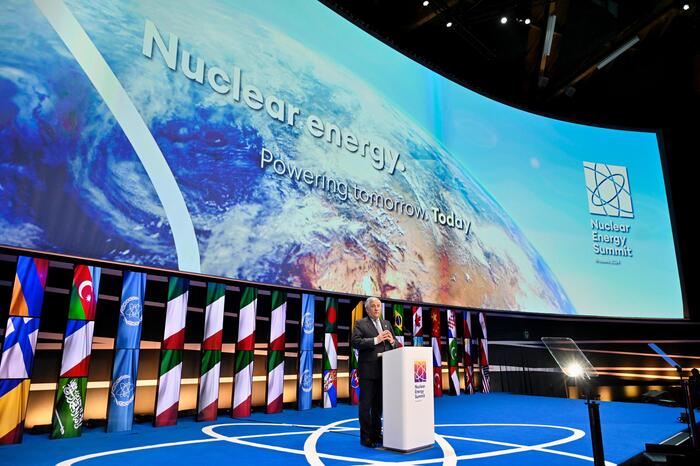First Nuclear Energy Summit: Harnessing Nuclear Energy to Mitigate Climate Change

Introduction
On March 21, 2024, Brussels, Belgium, witnessed a landmark event: the world’s first-ever Nuclear Energy Summit. This high-level gathering, co-chaired by the Belgian Prime Minister Alexander De Croo and the Director General of the International Atomic Energy Agency (IAEA) Dr. Rafael Mariano Grossi, brought together leaders from over 30 countries and the European Union (EU). China, United States, France, Japan as well as Pakistan also participated in the summit. The particular event marked a significant turning point in the global discourse on nuclear energy, to emphasize the importance of nuclear energy in lowering the consumption of fossil fuels, its potential role in dealing with climate change, achieving sustainable development goals, improving energy security, and accelerating economic development. This summit is followed by nuclear energy’s historic prominence at the UN Climate Change Conference (COP28) in December 2023. For the first time, nuclear energy was acknowledged as a viable tool in the fight against climate change. This historic recognition paved the way for the Brussels Summit, providing a platform for world leaders to translate intentions into concrete action plans. It will allow participating countries to discuss their perspectives on nuclear power’s critical role in achieving net zero emissions and develop national strategies to fully realize its potential.
Nuclear Energy Declaration
At the summit over 30 nations adopted a Nuclear Energy Declaration and committed to maximizing nuclear energy’s potential for clean energy, reduced emissions, and a sustainable future. This declaration signifies a global push for nuclear power as a key tool in tackling climate change and solidifying a unified effort to harnessing the power of nuclear energy for a cleaner future. The countries reiterated the importance of nuclear energy as a critical component of the global attempt to reduce greenhouse gases. Moreover, they made a strong commitment and pledged that “We are determined to do our utmost to fulfill this commitment through our active and direct engagement, in particular by enhancing cooperation with countries that opt to develop civil nuclear capacities in order to reduce greenhouse gas emissions in a nationally determined manner, including for transitioning away from fossil fuels in energy systems, in a just, orderly, and equitable manner, accelerating action in this critical decade, so as to achieve net zero by the mid-21st century.”

The Role of IAEA in Nuclear Energy and Climate Change
There are concerns about safety, waste management, and proliferation hazards when it comes to nuclear energy. The summit recognized these issues and aimed to resolve them. Discussions about best practices and international cooperation can be supported by the IAEA, a major participant in promoting nuclear safety and security. Therefore, International Atomic Energy Agency (IAEA) is positioned to play an important role in the nuclear energy landscape. The agency’s experience in safety standards, technical innovation, and nuclear security will be critical in assisting member states in establishing and implementing safe, efficient, and sustainable nuclear programs.
The IAEA launched Atoms4NetZero, an initiative to assist Member States in using nuclear energy to help them achieve net zero emissions, in response to the climate crisis. The Atoms4NetZero is for both nuclear operating and embarking countries that are interested in incorporating nuclear energy into their national energy mix in order to reach net zero targets. The developing countries will receive special consideration. The program offers Member States and stakeholders industry, financial institutions, and international organizations with technical expertise on the possibility of using nuclear energy to reduce the amount of carbon dioxide released into the atmosphere during the production of electricity and different sectors including transportation and industry. The Director General of IAEA at the summit said “Nuclear energy is an extraordinary asset whose full potential we need to untap if we are to keep climate change in check. The narrative that pits nuclear against wind and solar is wrong. It is time for the truth to get through, for leaders to pull the necessary levers and help make the global climate goals achievable.” He added, “the Nuclear Energy Summit must be a turning point for nuclear energy, calling for global investment across all economies. The IAEA, born from a vision of nuclear for peace and prosperity, is here to support this transition.”
Conclusion
The Nuclear Energy Summit signifies a renewed global commitment to leveraging nuclear energy as a key tool in tackling climate change and ensuring energy security. Leaders recognized that innovation is key to unlocking the full potential of nuclear energy and ensuring its long-term sustainability. However, there are still challenges to overcome such as regulatory hurdles as well as building new nuclear plants can be expensive and time-consuming. Additionally, ensuring the safe and secure management of nuclear waste remains a paramount concern. To translate commitments into concrete actions, all the participating countries need to develop robust policy frameworks that incentivize investment in new nuclear plants and streamline the regulatory process. Additionally, increased investment in research and development is also crucial to advance innovative technologies and solutions for climate change and ensure the long-term viability of nuclear energy.